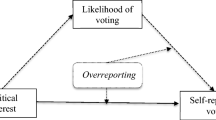Abstract
Misreport is a serious problem because inaccurate data may lead to erroneous substantive conclusions. This study examines the systematic misreport for the eventual presidential nominee in the American National Election Studies (ANES) presidential primary vote question. Using various data sources, this study demonstrates that misreport in presidential primaries is a serious problem leading to possible misinterpretation of the negative carryover hypothesis. Misreport also may be a product of time of interview. Earlier interviewing may help to solve part of the misreport problem.
Similar content being viewed by others
REFERENCES
Abramowitz, Alan I. 1989. Viability, electability, and candidate choice in a presidential primary election: a test of competing models. Journal of Politics 51: 977–992.
Abramson, Paul R., John H. Aldrich, Phil Paolino, and David W. Rohde (1992). Sophisticated voting in the 1988 primaries. American Political Science Review 86: 55–69.
Aldrich, John H. (1980). Before the Convention: Strategies and Choices in Presidential Nomination Campaigns. Chicago: University of Chicago Press.
Atkeson, Lonna Rae (1993). Moving toward unity: attitudes in the nomination and general election stages of a presidential campaign. American Politics Quarterly 21: 272–289.
Atkeson, Lonna Rae (1994). Presidential nomination campaigns and general elections: the divisive primary hypothesis revisited. Presented at the Annual Meeting of the American Political Science Association, New York, September 1–4.
Atkeson, Lonna Rae (1998). Divisive primaries and general election outcomes: another look at presidential campaigns. American Journal of Political Science 42: 256–271.
Bartels, Larry M. (1988). Presidential Primaries and the Dynamics of Public Choice. Princeton, NJ: Princeton University Press.
Box-Steffensmeier, Janet M., and Gary C. Jacobson (1995). Question wording and the house vote: some experimental evidence. Presented at the Annual Meeting of the Southern Political Science Association, Tampa, Florida, November 1–4.
Brady, Henry E., and Richard Johnston (1987). What is the primary message: horse race or issue journalism? In Gary R. Orren and Nelson W. Polsby (eds.), Media and Momentum. Chatham, NJ: Chatham House.
Brind, Joel, Vernon M. Chinchilli, Walter B. Severs, and Joan Summy-Long (1996). Induced abortion as an independent risk factor for breast cancer: a comprehensive review and meta-analysis. Journal of Epidemiology and Community Health 50: 481–496.
Cantor, David M. (1996). The effect of divisive presidential primaries on party loyalty. Presented at the Annual Meeting of the Southern Political Science Association, Atlanta, Georgia, November 7–9.
Coleman, James S. (1972). The positions of political parties in elections. In. Richard A. Niemi and Herbert F. Weisberg (eds.), Probability Models of Collective Decision Makingolumbus, Ohio: Merrill, pp. 332–357.
Daling, Janet R., Kathleen E. Malone, Lynda F. Voigt, Emily White, and Noel S. Weiss (1994). risk of breast cancer among young women: relationship to induced abortion. Journal of the National Cancer Institute 86: 1584–1592.
Eubank, Robert B., and David John Gow (1983). The pro-incumbent bias in the 1978 and 1980 National Election Studies. American Journal of Political Science 27: 122–139.
Eubank, Robert B., and David John Gow (1984). The pro-incumbent bias in the 1982 National Election Studies. American Journal of Political Science 28: 224–230.
Gronke, Paul (1992). Overreporting the vote in the 1988 Senate Election Study: a response to Wright. Legislative Studies Quarterly 13: 113–129.
Jacobson, Gary C., and Douglas Rivers (1993). Explaining the overreport of vote for incumbents in the National Election Studies. Presented at the Annual Meeting of the Western Political Science Association, Pasadena, California, March 18–20.
Lindefors-Harris, Britte-Marie, Gunnar Eklund, Olav Meirik, Lars E Rutqvist, and Kerstin Wiklund (1989). Risk of cancer of the breast after legal abortion during first trimester: a Swedish Register Study. British Medical Journal 299: 1430–1432.
Lindefors-Harris, Britte-Marie, Gunnar Eklund, Hans-Olov Adami and Olav Meirik (1991). Response bias in a case-control study: analysis utilizing comparative data concerning legal abortion from two independent Swedish studies. American Journal of Epidemiology 134: 1003–1008.
Mayer, William G. (1996). The Divided Democrats: Ideological Unity, Party Reform and Presidential Elections. Boulder: Westview Press.
Melbye, Mads, Jan Wohlfahrt, Jorgen H. Olsen, Morten Frisch, Tine Westergaard, Karin Helweg-Larsen, and Per Kragh Andersen (1997). Induced abortion and the risk of breast cancer. The New England Journal of Medicine 336: 81–85.
Noelle-Neumann, Elisabeth (1993). The Spiral of Silence: Public Opinion—Our Social Skin. Chicago: University of Chicago Press.
Polsby, Nelson W. (1983). Consequences of Party Reform. New York: Oxford University Press.
Polsby, Nelson W., and Aaron Wildavsky (1980). Presidential Elections: Strategies of American Electoral Politics. New York: Scribners.
Ranney, Austin (1975). Curing the Mischief of Faction: Party Reform in America. Berkeley: University of California Press. Ranney, Austin (1978). Changing the rules of the presidential nominating game. In J. Fishel (ed.), Parties and Elections. Bloomington: Indiana University Press.
Reiter, Howard L. (1985). Selecting the President. Philadelphia: University of Pennsylvania Press.
Southwell, Priscilla. L. (1986). The politics of disgruntlement: nonvoting and defection among supporters of nomination losers, 1968–1984. Political Behavior 8: 81–95.
Southwell, Priscilla. L. (1994). Prenomination preferences and general election voting behavior. Social Science Journal 31: 69–77.
Stone, Walter J. (1986). The Carryover effect in presidential elections. American Political Science Review 80: 271–280.
Stone, Walter J., Lonna Rae Atkeson, and Ronald B. Rapoport (1992). Turning on or turning off? Mobilization and demobilization effects in presidential elections. American Journal of Political Science 36: 665–691.
Stone, Walter J, Ronald B. Rapoport, and Lonna Rae Atkeson (1995). A simulation model of presidential nomination choice. American Journal of Political Science 39: 135–161.
Wattenberg, Martin. P. (1991). The Rise of Candidate-Centered Politics. Cambridge: Harvard University Press.
Wright, Gerald C. (1990). Misreports of vote choice in the 1988 ANES Senate Election Study. Legislative Studies Quarterly 15: 543–563.
Wright, Gerald C. (1992). Reported versus actual vote: there is a difference and it matters. Legislative Studies Quarterly 17: 131–142.
Wright, Gerald C. (1993). Errors in measuring vote choice in the National Election Studies, 1952–88. American Journal of Political Science 37: 291–316.
Author information
Authors and Affiliations
Rights and permissions
About this article
Cite this article
Atkeson, L.R. “Sure, I Voted for the Winner!” Overreport of the Primary Vote for the Party Nominee in the National Election Studies. Political Behavior 21, 197–215 (1999). https://doi.org/10.1023/A:1022031432535
Issue Date:
DOI: https://doi.org/10.1023/A:1022031432535




